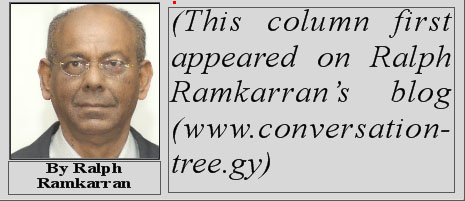That the current structure of the PPP is no longer effective, accountable and democratic is clearly indicated by the fact that since I became a member of the PPP’s leading bodies in the early 1970s, none of these bodies have ever had a financial report, despite the fact that a Secretary for Finance is elected by the new Central Committee after every Congress. The records of party congresses up to the 1960s show that at every Congress, which was then held every year, a financial report was given by the Treasurer who, like other officers, was elected by and accountable to, the Congress. No officer is elected any longer by the Congress and no officer gives an individual report except for the now defunct body for the few years of its active existence, the Auditing and Controls Commission.

Under the current constitution, as is by now well known, elections take place only for the Central Committee of 35 full members and 5 candidate members who do not have a vote. At its first meeting after the Congress the new Central Committee elects a number of secretaries, such as for Organisation, Finance, Education, etc, and members of the Organisation, Finance and Education Committees, where it is necessary for the secretaries to be assisted by committees. These particular secretaries and their committees do function, but many others do not. But they are not individually accountable, except to the Central Committee and no sanction is imposed on those secretaries who do not function. If they were elected by the Congress they would have had to report to the Congress. If their work is judged to be inadequate then democracy would prevail and better comrades would be elected. This method serves to ensure democracy and quality, the best person for the job, and defeats inbreeding within the Central Committee where the same secretaries and ninety per cent or more of the same members are elected Congress after Congress.
A new party structure can include a Chair, one or more Vice Chairs to ensure gender, youth, geographic and ethnic balance, a General Secretary, several Deputy General Secretaries responsible for Organisation, Finance, Education, etc, and such other officers as the party thinks are necessary. These officials should be elected individually at competitive elections at the Congress. This should form the core of a Working Committee, the other members of whom should be elected at the Congress as well, which would replace the Executive Committee but be of a smaller size. The latter is in fact supposed to be a Working Committee but it has been allowed to assume a dominant role in the decision-making process which belongs to the Central Committee but whose deliberations are so infrequent and so broadly structured that they are ignored by the Executive Committee.
Even the Central Committee should be restructured to make it less unwieldy and to include regional, gender, ethnic and youth representation rather than to be dominated by the same forces, heavily weighted in favour of Demerara, Congress after Congress. Term limits would not be a bad idea, but a former member ought to be able to contest again after a few terms. This would maintain a steady flow of new talent into the Central Committee.
Except for perhaps two persons, the Central Committee is completely ignorant of the party’s financial condition. There are no reports of any sort made to anyone. No one knows the party’s income or expenditure, where its bank accounts are held, the amounts in those accounts, the value of its assets, or any other information that would be normal for members of an organization to have. At times when an internal auditor who is a trusted comrade is available, such audits take place. But no audited accounts have never been shared. Since the party assumed office the contribution of fundraising to its income, the report of which was a highlight of the Congress in opposition days, has substantially reduced. It means that heavier reliance is placed on donations which brings with it increased influence pedalling.
The institutionalization of sound financial practices will help to break down the culture of secrecy which surrounds the party and which may have been necessary at one time but which has, along with lack of democracy, centralization and other negative survivals, have become obstacles to the party’s growth into a modern, optimally functioning machine, unhindered by the past, capable of developing policies to deal with the present, restoring its ideals, shedding its entanglements, resisting the negative forces always ready to wield influence and attracting broad based support.




